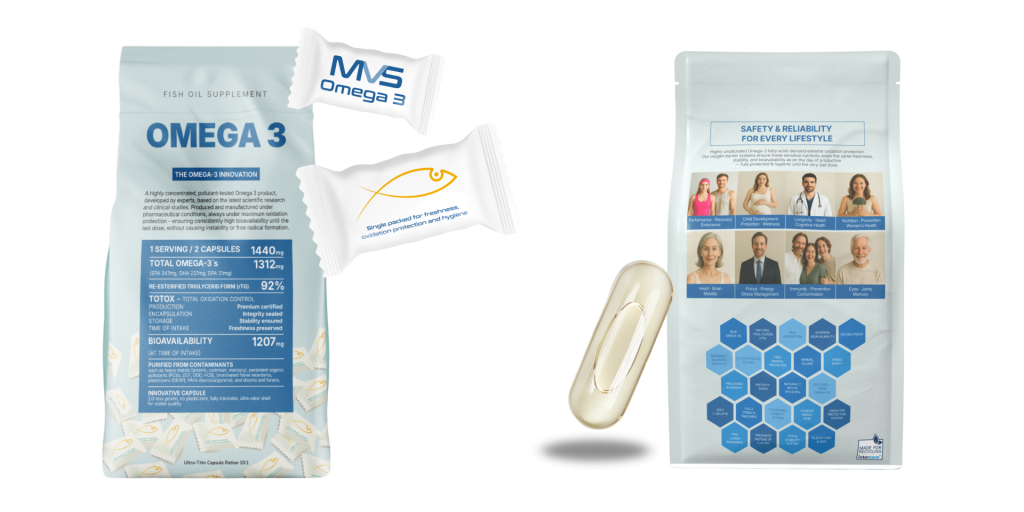Table of Contents
Introduction: Navigating Menopause with Nutritional Support
Menopause marks a natural transition in a woman’s life — typically between ages 45 and 55 — when menstrual cycles end and estrogen levels decline. While a natural milestone, the hormonal changes that accompany menopause can bring a cascade of symptoms: hot flashes, mood swings, sleep disturbances, joint pain, weight gain, cardiovascular risk, and bone loss.
In 2025, research shows that nutrition plays a central role in managing these changes — and Omega-3 fatty acids (EPA and DHA) are among the most effective nutrients for supporting women through menopause and beyond.
This article explores the latest science on Omega-3s for menopause, including benefits for heart, brain, bones, mood, weight, and skin — as well as practical guidance on dosage, supplementation, and safety.
What Are Omega-3 Fatty Acids and Why Are They Important in Menopause?
Omega-3s are essential fatty acids — nutrients that must be obtained from food or supplements.
- ALA (Alpha-linolenic acid): Found in flax, chia, and walnuts. Poorly converted (<5%) to EPA/DHA.
- EPA (Eicosapentaenoic acid): Anti-inflammatory; supports mood, heart, and metabolic health.
- DHA (Docosahexaenoic acid): Structural fat in the brain and eyes; crucial for cognition, memory, and nervous system function.
Why are omega-3 fatty acids especially important in menopause?
As estrogen declines, women face increased inflammation, oxidative stress, and cardiovascular and bone risks. Omega-3s directly counteract these effects by reducing inflammation, supporting vascular health, stabilizing mood, and protecting bone and joint function.
Core Benefits of Omega-3s for Women in Menopause
- Mood, Cognition & Mental Health
- Many women experience mood swings, anxiety, or depression during menopause.
- EPA improves neurotransmitter signaling (serotonin, dopamine).
- DHA protects brain cell membranes, supporting memory and focus.
- Studies (2023–2024): Omega-3 supplementation significantly reduced depressive symptoms in menopausal women.
- Benefit: Improved mood stability, sharper cognition, and lower risk of depression and dementia.
- Hot Flashes & Sleep Disturbances
- Hot flashes and night sweats affect up to 80% of women in menopause.
- Omega-3s modulate brain signaling that influences body temperature.
- They improve sleep quality by reducing nighttime awakenings.
- Clinical trial (2024): Women supplementing with Omega-3s reported reduced hot flash frequency and intensity.
- Benefit: Fewer hot flashes, deeper, more restorative sleep.
- Cardiovascular Health
- Postmenopause, cardiovascular risk rises sharply as estrogen’s protective effects wane.
- Omega-3s lower triglycerides and improve cholesterol balance.
- Support arterial flexibility, lowering blood pressure.
- Reduce risk of arrhythmias and cardiovascular disease.
- Meta-analysis (2023): Women with higher Omega-3 intake had a lower risk of fatal coronary events.
- Benefit: Protection against the #1 health risk for postmenopausal women.
- Bone Density & Osteoporosis Prevention
- Estrogen loss accelerates bone breakdown, raising osteoporosis risk.
- Omega-3s reduce bone resorption and enhance calcium absorption.
- 2023 studies: Supplementation improved bone mineral density when combined with vitamin D and calcium.
- Benefit: Stronger bones, lower risk of fractures.
- Joint Health & Inflammation
- Joint pain and stiffness are common menopausal complaints.
- Omega-3s reduce inflammation in joints and cartilage.
- Improve mobility and flexibility.
- Women report fewer aches when supplementing daily.
- Benefit: Easier movement, less stiffness, improved quality of life.
- Weight Management & Metabolism
- Declining estrogen often leads to abdominal fat gain and slower metabolism.
- Omega-3s increase fat oxidation and improve insulin sensitivity.
- Support lean muscle retention during weight management.
- Clinical data (2024): Omega-3s combined with exercise improved the waist-to-hip ratio in postmenopausal women.
- Benefit: Easier weight control, healthier body composition.
- Skin, Hair & Aging Gracefully
- Estrogen decline accelerates skin aging.
- Omega-3s improve skin hydration, elasticity, and barrier function.
- Reduce dryness, itching, and eczema flare-ups.
- Support hair follicle health for stronger, shinier hair.
- Benefit: Radiant skin and healthier hair, even through hormonal shifts.
Dosage Guidelines for Omega-3s in Menopause (2025 Update)
- General support: 500–1000 mg EPA+DHA per day.
- Cardiovascular protection: ~1000 mg/day EPA+DHA.
- Mood & cognition: 1000–2000 mg/day (high EPA formulations).
- Bone & joint support: 1000 mg/day combined with vitamin D & calcium.
Safe upper limit: Up to 3 g/day EPA+DHA is considered safe for healthy adults (EFSA, FDA).
Food vs Supplements
| Source | Pros ✅ | Cons ❌ |
|---|---|---|
| Food (Fish, Algae, Nuts/Seeds) | – Whole food nutrition (protein, vitamin D, selenium). – Algae = vegan DHA source. – Population studies show fish eaters have lower heart disease risk. | – Many women do not consume enough fatty fish. – Larger fish may contain mercury, PCBs, microplastics. – ALA in plants converts poorly to EPA/DHA. – Intake varies, hard to ensure consistency. |
| Supplements (Purified and Safe, like MVS Omega-3) | – Provide standardized, measurable doses of EPA/DHA. – Purification removes contaminants. – rTG form offers superior absorption. – Double packaging prevents rancidity. – Convenient daily intake. | – Many women do not consume enough fatty fish. – Larger fish may contain mercury, PCBs, and microplastics. – ALA in plants converts poorly to EPA/DHA. – Intake varies, hard to ensure consistency. |
Best approach: A combination of safe fish/algae + purified, rTG-form Omega-3 supplements.
Choosing the Right Omega-3 Supplement During Menopause
- Form: rTG (re-esterified triglyceride) = highest absorption.
- Purity: Must be free from heavy metals, PCBs, and microplastics.
- Freshness: Check oxidation levels (TOTOX, PV, AV). Low values = quality.
- Packaging: Double-protection (individually sealed capsules + oxygen-barrier pouch – the new golden standard, invented by MVS Pharma and utilized in MVS Omega-3).
- Certification: GMP, ISO, or third-party testing for safety.
MVS Omega-3 — Setting a New Standard in Purity, Stability, and Bioavailability
Developed by MVS Pharma’s medical and pharmaceutical experts, MVS Omega-3 represents a new generation of scientifically designed Omega-3 supplements. With a 92% natural rTG structure, verified bioavailability of 1207 mg, and our proprietary T-TOX™ oxidation control system, it ensures exceptional purity, stability, and absorption. Each batch meets European Pharmacopeia standards and is tested for over 20 potential contaminants — setting a benchmark for transparency and trust in modern nutritional science.

Not all Omega-3 supplements are created equal. The more unsaturated and effective Omega-3 molecules become, the more sensitive they are to air exposure — making oxidation protection the single most critical factor for preserving both safety and bioavailability. Once oxidation begins, oil turns rancid, loses efficacy, and may even generate free radicals.
At MVS Pharma, this challenge defined our mission. We engineered MVS Omega-3 as a next-generation formulation designed for uncompromised purity, verified stability, and maximum biological usability.
Key Facts:
- 90% Purified Omega-3 Concentration — delivering 1440 mg total oil with 1312 mg active Omega-3s (EPA 784 mg, DHA 518 mg) per serving.
- 92% Re-esterified Triglyceride (rTG) Form — structurally identical to natural fish oil for superior absorption (1207 mg bioavailable) and full physiological compatibility.
- T-TOX™ Total Oxidation Control System — exclusive German oxidation-management technology ensuring freshness and molecular integrity from production to the last capsule.
- Dual-Layer Packaging Protection — prevents oxidation, preserves hygiene, and guarantees stability throughout the product’s entire lifecycle.
- Ultra Thin Capsule Release 3.0™ — 2/3 less gelatin, no plasticizers, and >91% active ingredient load for transparency, purity, and optimized payload.
- Natural Tocopherol Matrix (α, β, γ, δ) — balanced antioxidant system calibrated to protect high-purity oil without destabilization.
- Pharma-Standard Purification & Testing — each batch is verified to meet European Pharmacopeia standards and is screened for over 20 contaminants, including heavy metals, PCBs, dioxins, PAHs, and plasticizers.
The result is an ultra-pure, oxidation-protected Omega-3 that maintains its natural structure, freshness, and full efficacy until the final dose — ensuring consistent support for cardiovascular, cognitive, visual, and immune health.
This means women can rely on our safe, stable, effective Omega-3 supplement that supports heart, bones, mood, and graceful aging.
Summary: Omega-3 as a Menopause Ally
Menopause is not an illness but a natural transition — yet it brings challenges that can affect quality of life and long-term health. In 2025, research confirms that Omega-3 fatty acids provide broad, evidence-based support:
- Improve mood, cognition, and sleep.
- Reduce hot flashes and inflammation.
- Protect the heart and circulation.
- Strengthen bones and joints.
- Support skin, hair, and beauty.
- Aid in weight management and metabolism.
For women seeking natural, effective support, Omega-3s are a cornerstone nutrient for thriving during menopause and beyond.
Disclaimer: As a service to our readers, MVS Pharma GmbH publishing provides access to our library of archived content in our blog. Please note the date of the last review or update on all articles. No content on this site should ever be used as a substitute for direct medical advice from your doctor or other qualified clinician.
FAQs
-
Can Omega-3s help with hot flashes?
Yes. Studies show they reduce frequency and severity, while improving sleep quality.
-
How much Omega-3 should I take in menopause?
500–1000 mg/day EPA+DHA is recommended, with higher doses for heart or mental health.
-
Are Omega-3 supplements safe with HRT?
Yes. They complement hormone replacement therapy but should be taken under guidance.
-
Can Omega-3s protect bones in menopause?
Yes. They reduce bone loss and improve density, especially when combined with vitamin D and calcium.
-
Is algae oil a good option for Omega-3s?
Yes. It provides DHA, especially useful for vegans, though combined EPA+DHA supplements may be more comprehensive.
-
What makes MVS Omega-3 different?
It offers oxidation resistance, superior absorption in rTG form, full safety testing, and double protection packaging — ensuring purity and potency from production to consumption.
Sources:
- Database of Abstracts of Reviews of Effects (DARE): Quality-assessed Reviews – “What is the effectiveness of the use of polyunsaturated fatty acid omega-3 in the treatment of depression?”
- National Library of Medicine document – “Recent Clinical Trials Shed New Light on the Cardiovascular Benefits of Omega-3 Fatty Acids”
- National library of medicine – “Effects of Omega-3 Polyunsaturated Fatty Acids Intake on Vasomotor Symptoms, Sleep Quality and Depression in Postmenopausal Women: A Systematic Review”


